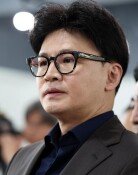President Roh Comes to the Forefront over Forming a Coalition Government
President Roh Comes to the Forefront over Forming a Coalition Government
Posted July. 06, 2005 00:37,
President Roh Moo-hyun revealed his position on July 5, Under the ruling minority and opposition majority structure, a nations state affairs does not function smoothly since the National Assembly, the government, the ruling party, and the opposition parties tend to be in conflict with each other, adding, Most nations, if under this circumstance, form a coalition government.
In a statement titled South Koreas politics should return to normal posted on the Cheong Wa Dae home page on that day, President Roh raised the need of forming a coalition government once again, saying, Creating a coalition government has been quite naturally carried out in most nations, and after forming a coalition government, the political situation in which the opposition parties control the Parliament did not emerge.
In response, with the opposition parties expressing their concerns over an attempt of creating a ruling majority structure by artificial realignment, urging that Cheong Wa Dae should clarify the specific plan on the power structure reorganization, controversy surrounding this issue is increasingly growing.
As opposed to his unofficial remark uttered during the 11 key figures meeting, a leadership meeting among the ruling Uri Party, the government, and Cheong Wa Dae on June 24, President Rohs remark on that day is expected to cause a stir because after Presidential Secretary for Public Information Cho Ki-sooks remark on July 4, he expressed his stance firmly to the public.
President Roh noted, It is difficult to even bring up a matter of forming a coalition government in South Korea since the public denounces the attempt, labeling it as forming a strategic political alliance or an artificial political realignment first, adding, Despite that the forced moves, including bribing, intimidating, and behind-the-scene politics, have already vanished, our view is abnormal, still unchanged compared to the past.
President Roh also raised the necessity of gathering the publics opinions over the power structure operation and reorganization, saying, Under the situation in which the opposition parties control the National Assembly, the Cabinet members are having a hard time in administering their state affairs due to frequent dismissal motions against them, and since the president has no right to dismiss the National Assembly, the government is driven to a corner, resulting in difficulty in administering state affairs.
Regarding President Rohs remark, Moon Hee-sang, chairman of the ruling Uri Party said on the same day, It is natural to cooperate with the opposition parties in a democratic party, and if the ruling party holds a majority in the National Assembly, it does not matter, but if holding a minority in the National Assembly, it is inevitable to cooperate with the opposition parties over policies.
In response, during a caucus of the Grand National Party (GNP) held in the National Assembly, GNP floor leader Kang Jae-sup warned, If the ruling side plans to form a ruling party majority structure by artificial realignment beyond a level of cooperating with the opposition parties over policies, it will backfire.
In addition, Democratic Labor Party chief vice floor leader Sim Sang-jeong said, The ruling side should present a specific alternative over the power structure reorganization, including forming a coalition government, in an official and transparent manner. Millennium Democratic Party spokesman Yoo Jong-pil urged, The ruling side should form a coalition government with the public, excluding the specific party.
Yeon-Wook Jung jyw11@donga.com jnghn@donga.com






![[단독]“물건 보냈는데 돈 안와”… 국제정세 불안에 수출대금 8000억 떼일 위기](https://dimg.donga.com/c/138/175/90/1/wps/NEWS/IMAGE/2026/01/15/133160131.1.jpg)
